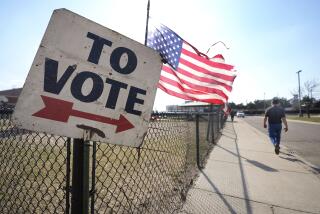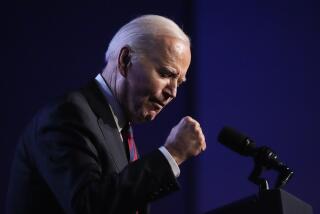Nonwhite voters and cultural shifts make 2012 election pivotal
WASHINGTON — The standard narrative of Barack Obama versus Mitt Romney runs something like this:
The president struck first, using a barrage of television advertising in key states to depict Romney as an out-of-touch plutocrat. Romney stumbled through a poorly planned late-summer trip to Europe and hosted a lackluster convention where he was upstaged by Clint Eastwood and an empty chair.
Early in September, Bill Clinton wowed the Democratic convention, giving Obama a lead in polls. That lead expanded when a video hit the airwaves in which Romney appeared to disparage 47% of Americans as seeking dependency.
Headed for an easy victory, Obama nearly capsized his campaign with a listless debate. He fought back, gave an empathetic response to Superstorm Sandy, and then prevailed on election day with the help of a highly targeted, technologically advanced effort to motivate and turn out his supporters.
All that is true. Yet it misses the essence of what happened.
The 2012 election marked the point at which a new American electoral coalition solidified its hold on politics, one built on the country’s growing nonwhite population and on cultural changes that have given younger voters of all races a far different outlook on political issues from that of their elders.
The impact could be seen not just in Obama’s reelection and Democratic successes in the Senate, but also in statewide referendums on same-sex marriage in which advocates of equal rights for gays and lesbians unexpectedly won four out of four. In 2004, conservatives put marriage referendums on the ballot in hopes of boosting their prospects; just eight years later, the political impact had completely reversed.
If the new coalition holds, future historians will look back at this campaign as one, like Franklin D. Roosevelt’s in 1936 and Richard M. Nixon’s in 1972, that marked a long-term realignment of the nation’s politics.
If it holds. One enormous difference separates Obama’s reelection from Roosevelt’s and Nixon’s: Those were landslides; Obama won narrowly. Millions of votes remain uncounted, but the president’s victory margin probably will be about 2.5 percentage points. Nor did he succeed in carrying large numbers of House candidates into office with him.
That difference measures the enormous weight of a poor economy, which pulled down Obama’s prospects and imperils the support he assembled.
“One way to interpret this involves changing cultural values and demographics. When those things come together, you get these pivot elections, and that’s what this was,” said UCLA political science professor Lynn Vavreck.
But “the economy is a huge thing here,” she added. The economy this year grew just fast enough for a candidate with the advantage of incumbency to win. “If it doesn’t grow more quickly, the Republicans will win in 2016,” she said.
Demographic shifts don’t affect politics all by themselves — campaigns must take advantage of them, and Obama’s did. Much of the work of his vaunted campaign organization happened long before election day. Democrats spent two years working at “changing the electorate,” said Obama’s Florida campaign director, Ashley Walker. The campaign’s registration drives helped boost the number of Latino voters in the state by 300,000 compared with 2008.
Assuming that turnout among those new voters resembled that of other Latinos in the state, Obama probably netted at least 70,000 more votes than Romney among those new registrants. With almost 100% of the vote counted Saturday, his margin statewide stood at about 74,000.
Nationally, according to exit polls, Latinos gave Obama 70% of their votes, Asian Americans 73% and blacks more than 90%. Voters younger than 30 went for Obama, 60% to 37%, and unmarried women sided with him by more than 2 to 1. Each of those groups made up a larger share of the electorate in 2012 than in 2008, except for blacks, who were steady.
Throughout American history, rising groups in the electorate have had an impact on policy. Already, Tuesday’s results are being felt. House Speaker John A. Boehner (R-Ohio) gave a television interview Thursday in which he indicated support for changing the country’s immigration laws. “A comprehensive approach is long overdue, and I’m confident that the president, myself, others, can find the common ground to take care of this issue once and for all,” he told ABC’s Diane Sawyer.
Earlier this year, Boehner had said that more modest immigration legislation could not pass the House.
Debates over federal spending may also be shaped by the new electoral math. During his first term, Obama effectively used his economic stimulus legislation to cushion the recession’s impact on the poor and unemployed. For his second term, he has repeatedly talked about providing more money for college education and job training — programs that help mostly Americans younger than 30.
To pay for those programs and reduce the overall size of the government’s long-term deficit, Obama has pushed for higher taxes on upper-income Americans, a Republican-leaning group. He’s also indicated willingness to pare back spending for Medicare, particularly for the better off. Although Democrats have long championed Medicare, the program’s main beneficiaries, Americans older than 65, compose the one age group that strongly backed the Republicans.
More to Read
Start your day right
Sign up for Essential California for news, features and recommendations from the L.A. Times and beyond in your inbox six days a week.
You may occasionally receive promotional content from the Los Angeles Times.







